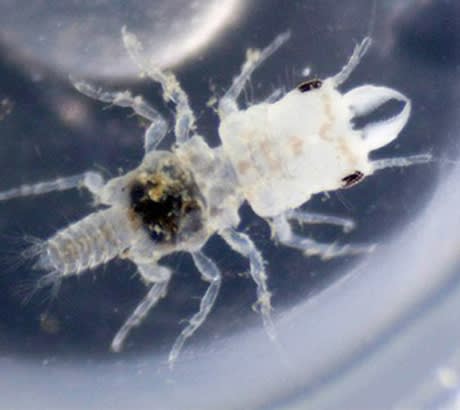Scientists have been tipping their hats to the music community this year, naming a few newly discovered species after their favourite performers. First, we learned Beyonce was the inspiration behind the Scaptia (Plinthina) beyonceae fly, and Lou Reed was toasted in May via the Loureedia velvet spider. Now, a newly-named species of parasitic crustacean will honour reggae great Bob Marley.
The Gnathia marleyi attacks fish in the Carribean coral reefs, but despite the species' inclination to sneak up on unsuspecting sea life, scientists maintain the correlation between the blood feeders and the music icon is only skin deep.
"I named this species, which is truly a natural wonder, after Marley because of my respect and admiration for Marley's music," Arkansas State University marine biologist Paul Sikkel said in a statement. "Plus, this species is as uniquely Caribbean as Marley."
Early in their development, Gnathia marleyi will hide among the coral rubble, algae, and sea sponges before launching an attack, in which they infest their host. Interestingly, the parasitic species doesn't feed during adulthood, surviving for two to three weeks off their last meals as juveniles.
Sikkel continued to say that Gnathia marleyi are comparable to land-based parasites like ticks or mosquitoes.
Thanks to the Guardian for the tip.
The Gnathia marleyi attacks fish in the Carribean coral reefs, but despite the species' inclination to sneak up on unsuspecting sea life, scientists maintain the correlation between the blood feeders and the music icon is only skin deep.
"I named this species, which is truly a natural wonder, after Marley because of my respect and admiration for Marley's music," Arkansas State University marine biologist Paul Sikkel said in a statement. "Plus, this species is as uniquely Caribbean as Marley."
Early in their development, Gnathia marleyi will hide among the coral rubble, algae, and sea sponges before launching an attack, in which they infest their host. Interestingly, the parasitic species doesn't feed during adulthood, surviving for two to three weeks off their last meals as juveniles.
Sikkel continued to say that Gnathia marleyi are comparable to land-based parasites like ticks or mosquitoes.
Thanks to the Guardian for the tip.
